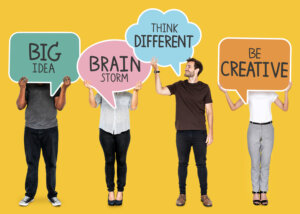Understanding the “Describe Yourself” Question
In many job seekers’ experiences, there are some questions during an interview that are more common than others. One of these questions is, how would you describe yourself?
While it may be evident to some of what you shouldn’t say, you may be surprised at how many job seekers give the following answer or similar: “I am married with two children and have a dog, and I like playing tennis on the weekends with my friends.”
If you answered the question this way, you will probably get a few strange looks. Like many interview questions, there are a few answers that you can use; the latter is not one of them!
Interview Speak
Hiring managers use something called interview speak. The trick is interpreting what they want to hear when they ask or tell you to describe yourself. Remember to be concise, use only a few words, and don’t tell your entire life story. Descriptive words are helpful, as they do not require using exact words to describe yourself. Using adjectives similar to job postings is also a good idea. Our blog will help you craft an answer that piques the hiring manager’s interest and lets you pass job interviews with flying colors.
Why Do Interviewers Ask This Question?
Interviewers often ask candidates to describe themselves for several reasons:
Self-awareness: It helps hiring managers assess your strengths and how well you know your strengths, weaknesses, and personality traits. Self-awareness is valuable in most positions.
Communication skills: Your response demonstrates your communication ability and ability to clearly and concisely explain your qualities. Good communication is crucial in most jobs.
Cultural suitability: It gives them a better idea of your personality and values, helping an interviewer evaluate how effectively you blend in with their company’s culture.
Relevance to the role: Your answer can highlight specific qualities or experiences relevant to the job you’re applying for and show how you can contribute to the team.
Confidence: It gives interviewers a sense of your trust and how you present yourself, which can be essential for roles that require public speaking, leadership, or client interaction.
This question helps an interviewer understand you as a candidate above what it says on your resume.
Common Variations of the “Describe Yourself” Interview Question
1. Can you tell me a little about yourself?
One of the most common icebreakers is being asked the above question. The interviewer wants a concise summary of your professional experience, relevant skills, and positive attributes you can add to the role. It is your opportunity to sell yourself, particularly with experiences that align with the opportunity. The best responses typically include.
- Communicate a concise outline of your present or most current role.
- Highlight accomplishments and relevant proficiencies.
- Speak about what you hope to achieve in your career and what interests you in this position.
Example: “I’m currently a project manager at XYZ Company, where I lead a team of developers on software projects. I have over five years of experience managing large-scale projects and successfully implemented agile methodologies that improved our delivery times by 20%. I’m passionate about leading teams to success. I am excited to bring my expertise to your company, especially in a role that aligns with my career goal of furthering my skills in innovative tech solutions.”
How would you describe your personality?
Interviewers need to understand your experience, skills, and who you are, so they ask this question: They are also after candidates whose personality suits their company culture and the role. Here, you want to emphasize your soft skills and personal attributes that you will be a candidate they should consider.
Example: “I would describe my personality as proactive and adaptable. I thrive in dynamic environments where I can take the initiative and solve problems creatively. I’m also a strong communicator, which helps me work well in team settings and ensures that projects run smoothly. Additionally, I’m very organized and detail-oriented, which has always helped me meet deadlines and deliver high-quality work.”
What are your strengths and weaknesses?
When asked about your strengths and weaknesses, hiring managers assess self-awareness and honesty. Ensure that you highlight strengths that fit the role. When speaking about weaknesses, identify areas that need improvement and the steps to get there.
Example: “My key strengths include my analytical skills and ability to remain calm under pressure. I know how to break down complex problems into manageable parts and find effective solutions. As for my weaknesses, I sometimes find it challenging to delegate tasks because I like to ensure everything is done perfectly. However, I’ve been working on this by trusting my team more and providing them with clear guidance and support to achieve our goals together.”
In your interview preparation, ensure that you have well-thought-out and honest answers that demonstrate your experience, qualifications, and personality. Also, ensure that your answers fit what the interviewer is looking for.
Crafting a Strong Response for a Job Interview
- Focus on attributes that align with the job duties of the position you’re applying for.
- Highlight your strengths and qualities that make you a valuable candidate.
Choosing Positive Words to Describe Yourself
- Use positive words that show your strengths and qualities.
- Avoid negative phrases that highlight shortcomings or weaknesses.
Examples: “results-driven,” “team player,” “problem-solver,” “adaptable,” and “and creative.”
Showcasing Your Expertise with Numbers or Results
Emphasize your ability to produce results: Quantifying your achievements shows your capabilities. Mention specific metrics to illustrate your impact.
Example: “In my previous role, I increased sales by 30% over six months by implementing a new customer relationship management system.”
Highlight your goal-oriented approach: Show that you are focused on achieving results and meeting objectives.
Example: “I set quarterly targets for myself and my team and consistently exceeded them by 15% by staying focused and strategically prioritizing tasks.”
Use specific examples to demonstrate your skills and achievements: Providing concrete examples makes your claims more credible and relatable.
Example: “By introducing a new project management tool, I reduced project turnaround time by 25%, allowing us to take on more clients and increase revenue.”
Talking About Yourself as a “Constant Learner”
Emphasize your willingness to learn and grow: Show that you are committed to continuous improvement and staying current in your field.
Example: “I’m always eager to expand my knowledge and skills. Recently, I completed a certification course in data analytics to stay updated with the latest industry trends.”
Highlight your proactive approach to seeking new opportunities: Demonstrate that you take the initiative to learn new things and advance your career.
Example: “I regularly attend industry conferences and webinars to learn about emerging technologies and best practices, which I then apply to my work.”
Use this answer for positions that require continuous learning and professional development: Highlighting your dedication to learning is particularly relevant for roles that evolve rapidly or involve complex problem-solving.
Example: “Given the fast-paced nature of this industry, I continuously seek learning opportunities to ensure I can contribute effectively and stay ahead of the curve.”
Emphasizing Your Soft Skills
Describing Yourself as Flexible and Resourceful
Use the phrase “I’m a very flexible and resourceful person” to describe yourself. Start with a clear statement about your adaptability and problem-solving skills.
Example: “I’m very flexible and resourceful, able to adapt quickly to changing situations and find innovative solutions to challenges.”
Highlight your ability to adapt to changing situations: Show that you can handle unexpected changes and still perform effectively.
Example: “When our team faced a sudden shift in project scope, I quickly re-prioritized tasks and resources to meet the new deadlines without compromising quality.”
Use this answer for positions that require flexibility and adaptability: Candidates who are adaptable and resourceful benefit from roles that involve frequent changes or require quick thinking.
Example: “In fast-paced environments like this one, my flexibility and resourcefulness enable me to navigate changes efficiently and keep projects on track.”
Presenting Yourself as a “Team Player”
Emphasize your ability to work well with others: Highlight your collaborative nature and ability to contribute to a team.
Example: “I thrive in team settings and enjoy collaborating to achieve common goals.”
Highlight your communication and teamwork skills: Effective communication and teamwork are crucial for successful collaboration.
Example: “I have strong communication skills that help me coordinate effectively with team members and ensure everyone is aligned on project objectives.”
Use this answer for positions that value teamwork and collaboration: Many roles require strong teamwork abilities, making this a pivotal quality to emphasize.
Example: “In my last project, I worked closely with cross-functional teams to deliver a successful product launch, leveraging each member’s strengths to achieve our goals.”
By incorporating these elements into your responses, you can effectively showcase your strengths, adaptability, continuous learning mindset, and teamwork capabilities in an interview. Tailoring Your Response to the Job
Researching the Organization to Impress the Hiring Manager
Research the company culture, values, and mission: Understanding the firm’s culture, philosophy, and purpose helps you curate your responses to meet what the hiring manager is looking for in their ideal candidate. Doing this demonstrates that you’ve researched and are genuinely interested in the company.
Example: “I admire that your company prioritizes innovation and sustainability. These values resonate with me, as I am passionate about creating eco-friendly solutions and have a track record of implementing innovative strategies in my previous roles.”
Choose words that align with the company’s values and mission: Use terminology that reflects the company’s ethos to show that you are an excellent cultural fit.
Example: “I’m particularly excited about your mission to drive social impact through technology. In my previous job, I led projects that leveraged tech to improve community services, aligning well with your company’s goals.”
Focusing on Professional Qualities Relevant to the Job
Tailor your words to the specific job you’re applying for: Customize your responses to highlight the skills and qualities that are most relevant to the position.
Example: “For this marketing manager role, my experience in digital marketing and data analytics will be precious. I have a proven track record of increasing online engagement and conversion rates through targeted campaigns.”
Identify the keywords, qualities, and skills the employer is looking for. Carefully read the job description to understand what the employer prioritizes and incorporate those into your answers.
Example: “The job description mentions the need for strong project management skills and attention to detail. In my previous role, I managed multiple high-stakes projects simultaneously while maintaining a meticulous eye for detail, ensuring all deliverables met quality standards.”
Delivering Your Response with Confidence
Being clear and concise in your answer: Avoid complex language and keep your responses straightforward and impactful.
Example: “I excel in fast-paced environments and have a talent for quickly understanding and addressing client needs. This has consistently resulted in high customer satisfaction and repeat business.”
Avoiding common mistakes in a job interview:
Need to adapt your response: Ensure your answers are relevant to the specific employer and role.
Repeating your resume: Instead of repeating what’s on your resume, provide a brief professional narrative highlighting your most relevant experiences.
Giving a chronological life history: Focus on experiences and skills pertinent to the job rather than providing a complete history.
Example: “Rather than listing all my previous roles, I’d like to highlight my recent experience leading a cross-functional team to launch a new product, which resulted in a 50% increase in market share within six months.”
Final Tips and Best Practices
To make your response stand out from other candidates, provide specific examples that uniquely showcase your skills and qualities.
Example: “I was awarded ‘Employee of the Year’ for implementing a process improvement that reduced production costs by 20% while maintaining quality, demonstrating my ability to drive efficiency and innovation.”
Show honesty and humility while looking confident. Balance confidence with humility to present yourself as capable yet approachable.
Example: “While I’m confident in my project management skills, I’m also eager to learn from the experienced team here and grow further in this dynamic environment.”
Mastering other common interview questions: To prepare thoroughly, practice answering other frequent questions, like discussing your strengths and weaknesses.
Example of strengths and weaknesses: “One of my strengths is my analytical thinking, which allows me to solve complex problems efficiently. However, I’ve improved my delegation skills to ensure my team members can grow and contribute their best.”
How much should the job posting impact the words that you use?
When preparing responses for an interview or creating a cover letter, it is a good idea to look carefully at the words used in the job posting and tailor both based on that. Ensuring the words, adjectives, and expressions fit the job description while underscoring your proficiencies and background is crucial. For example, if the job posting emphasizes customer centricity and proactivity, ensure you use language that describes your achievements and personal qualities.
Three Words You Must Use To Describe Yourself
Three must-use keywords to describe yourself could be “team-oriented,” “goal-driven,” and “consistent performer.” When asked about your last position, focus on core accomplishments and how you consistently surpassed expectations.
What do you say if the interviewer asks about your last job?
When asked about your last position, the interviewer wants a to-the-point, favorable, and focused response that meets the specific job requirements. Here’s an ideal structure to use when crafting an answer:
Accomplishments: Mention relevant achievements that showcase your ability and critical contributions.
Relate to the New Position: Ensure you connect your background to the must-haves of the job you desire.
Positive Perspective: Ensure you sound positive, even if you left your last job under challenging circumstances.
Example Answer:
“At my last job, I worked as a project manager, leading a team to complete several high-impact projects successfully. One of my key accomplishments was streamlining our project workflow, which increased efficiency by 20%. I consistently set firm goals and ensured we met our deadlines while maintaining a high customer focus. My colleagues describe me as a dedicated and goal-oriented person who can motivate the team to achieve our objectives. I’m excited to bring my project management skills and customer-focused approach to your company, where I believe I can contribute to achieving your organizational goals.”
This response incorporates keywords such as “key accomplishments,” “positive attitude,” “consistently set firm goals,” “customer focus,” and “goal-oriented,” which align with the expectations of many potential employers.
Additional questions a Potential Employer could ask
How would people describe you in a professional setting?
If a potential employer asks other questions, like “How would people describe you in a professional setting?” you can mention that colleagues often see you as a “people person” with leadership qualities and a positive outlook.
What relevant skills do you bring to the position?
Discuss what relevant proficiencies you could add to the opportunity, ensuring they fit the job description. For customer-focused and leadership positions, talk about examples that prove claims of your successes.
Crafting an Effective Cover Letter
When writing a cover letter, highlight your interests and critical accomplishments to demonstrate your suitability for the position. For example, mentioning a leadership position shows you can lead teams successfully. A positive outlook and qualities like being a people person will be valuable in roles that need strong interpersonal skills.
Many employers value consistently setting firm goals and maintaining a strong customer focus. Including these elements in your cover letter can provide a comprehensive view of your professional character and dedication. Additionally, seeking career advice and continuously improving your skills reflect your commitment to personal and professional growth.
Bottom Line: Using Your Best Words to Describe Yourself as the Right Candidate for the role
Expressing yourself well is crucial to your success in landing a job. Taking note of the job description and connecting your proficiencies and background, you can present yourself as a choice candidate. Emphasizing core accomplishments, personal qualities, and relevant capabilities helps create a compelling picture of your fit for the role.
Ensure you mention your leadership experiences, customer-centricity, and skills in setting and attaining goals. By showing a positive outlook and people-focused approach, you can show that you are appropriate for the role and have the potential to contribute to the company’s growth. The goal is to show confidence, ability, and the value you can bring to the organization.
 Sections of this topic
Sections of this topic















